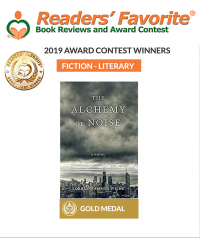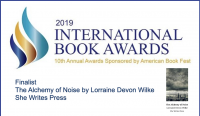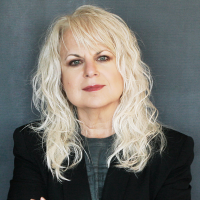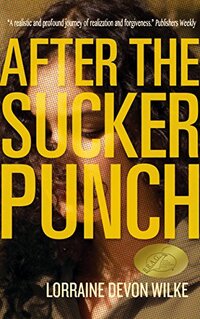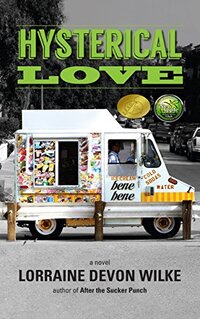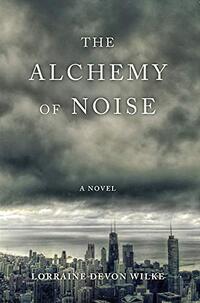As readers, it's always fascinating to hear about the lives of the author behind the book; about the creator of the tale that captured our interest. Could you tell us a bit about your hometown and about your family growing up?
Though I was born in Chicago, the bulk of my childhood was spent in two different small towns in northern Illinois: the grade school years were in Richmond, a tiny farm town near the Wisconsin border; the high school years in Crystal Lake, a larger, but still very small lake community; college (as a theater major) got me to the University of Illinois in Champaign/Urbana.
As one of eleven kids (third oldest), I was a “little mommy” at a young age, and while there were many wonderful times mixed in with the predictable chaos of a too-big family, I was ready to hit the road as soon as I could. Which I did, literally, when I was recruited into a rock & roll band my junior year in college. We were on the road for 2.5 years all over the Midwest and mountain states, which ultimately led me to Los Angeles, a place I felt destined to be and where I’ve been since.
Were your parents ever skeptical of your dreams of writing for a living? Who has been your greatest supporter?
I was fortunate that both my parents were great fans of the creative arts, so my being the artistic sort was not strange or off-putting to them. In fact, all my sibs are artistic in various ways, whether in theater, films & TV, graphic arts, design, etc. We’re a very creative family. That was likely nurtured by the fact that, for a good many years, we did without TV; library books, music, and theatrical events were our main entertainment, and I have no doubt that played a huge part in developing our creative proclivities.
However, once I got older and on my own, my father made clear (in a series of journal entries I read posthumously, inspiration for my first novel, After the Sucker Punch) that he wasn’t exactly impressed with my career trajectory. It was judgment that had sting in retrospect, but I was so fiercely focused and determined to make it as a creative artist that no one could’ve stopped me, not even a doubting father. My first years in LA were in the pursuit of acting, then I got back to singing and spent the next chapter writing and recording songs, performing all over the western states with some of the best musicians in the world. Somewhere in there I added screenwriting to the mix and had some luck with small indie films, one of which was shot in Seattle, where I met my husband... a perfect segue to your second question above: My husband is and always has been my greatest supporter, in ways both tangible and intangible, for which I am fortunate and very, very grateful.
You write essays and commentary at Medium. What made you decide to start doing this, exactly? And how would you describe your experience with it so far?
I’ve always been a person with strong opinions about what goes on in the world, and was known to write the occasional “letter to the Editor” back before the web exploded. When the Internet came to being, I put that mental energy into creating a blog in 2010 (which I still manage) called Rock+Paper+Music. In those early years, most of my pieces were on political topics or focused on the arts—music, movies, etc., and I had no problem voicing my very candid opinions. I built up a decent following, which landed me a contributor’s spot at HuffPost in 2011; very prestigious at the time, particularly since Ariana Huffington herself invited me in.
My work at HuffPost continued to be very outspoken, politically and artistically oriented, and that was a heady time of big readership, viral posts, reprints in online magazines and academic books, all of which got me a lot of attention as a writer. Sadly, they discontinued the contributors program in 2018, but by that point I was already winding down my article writing to focus, instead, on getting a novel written. But, while I’ve kept my blog going, the loss of HuffPost definitely impacted the reach of my work, which is when I started writing at Medium. But, I’ll be honest with you: there is so much content on that site, on every site, for that matter, and so many people outputting so much great stuff, it’s hard to get noticed, read, pulled from the pack to inspire the kind of readership needed to stand out. And given that my primary focus is now on writing and promoting my books, I don’t spend as much time cranking out articles on hot topics and doing the promotion needed to be seen and heard. Still, I write commentary when I’m moved to, on topics that either inspire me or piss me off, and that has to do for now!
How did you get into screenwriting?
Being involved in acting in my early LA years, I read many a stage- and screenplay, and given my innate facility for writing (discovered in college), it wasn’t much of a stretch to start developing that skill in a more organized manner. I started writing one-act plays, short film scripts, then movie spec scripts, initially with co-writers. I then moved on to writing my own projects with the intent of getting them optioned for development. I was fortunate to have that happen with several screenplays, some by high profile companies—which was exciting—but, unfortunately, none actually got made, which blunted the excitement! Twice it was due to strikes within the movie industry; other times it was issues related to lack of funding. So when my screenplay, To Cross the Rubicon (written with Patricia Royce), was produced by The Lensman Company, a film company in Seattle, it was a very exciting venture. Both my co-writer and I had leading roles, J.D. Souther and Billy Burke were our co-stars,even David Crosby and Jeffrey Dean Morgan appeared in small roles. It was a heady time and the film did well on the festival and indie circuit.
After that, and despite momentum kicked up by that success, other screenplays I’d written didn’t cross that same finish line. Lots of awards in various screenwriting contests, but no production deals. So two of them, whose stories I loved and didn’t want to shelve, were adapted into novels. My second novel, Hysterical Love, was adapted from my award-winning screenplay, The Theory of Almost Everything, and my current “work in progress,” Chick Singer, is being adapted from another awarded screenplay, A Minor Rebellion. Who knows... I may turn all my screenplays into novels before long!
What fears did you have while publishing your book, After the Sucker Punch?
I can’t say I ever had "fears” about publishing that book—I was already too seasoned at the creative game to be the fearful sort!—but it was my first novel, so there were a lot of unknowns and a pretty hefty learning curve regarding the medium, both creatively and commercially. I felt confident about the story I’d written, particularly after it went through a slew of trusted readers and editors, but the industry itself was formidable. I spent over a year querying literary agents to no avail, but I so thoroughly believed in the book I decided to self-publish, which came with another learning curve! With lots of research, advice, and help from people who’d been down that road, I self-pubbed it in 2014. I was pretty decent at the marketing and promotion game from years of earlier endeavors, including the promotion of my blog, so I leapt into that end of things vigorously, and the book did swell. Wonderful responses from readers, awards from a variety of contests, and it’s still being readand reviewed to this day.
But a quick note about “fear”: Given that the story was incited by a factual event in my life—my father’s journal about me—I was sensitive (a truer take than “fearful,” I think! J ) to its fictionalization, intent on taking the kernel of that incident to develop a fully imagined narrative, free of obligation to “what really happened.” Some in my family saw some factual parallels, and there were some, but despite what may have been borrowed from real people and real life, it is fiction, very frank and candid fiction, but fiction that digs deep into matters of human’s frailties and foibles. There is some courage necessary when putting out a novel with those sets of characteristics!
Do you think your background in screenwriting and songwriting has played any special role in your career as an author?
Yes. I believe my years of screenwriting in particular honed my ability to write good dialogue (the essential basis of a good screenplay), as well as understand the three-act arc required of any good story (I’ve been told by record producers that even the lyrics of my songs came with a narrative arc, which was meant as a compliment!), all of which informed my style of novel writing. I spend time creating deeply fleshed-out characters, then put a lot of stock in what they have to say and where they want to take the story. I’m not someone who creates an “outline”; I tried that method but it didn’t work for me. Instead, I make notes of where I want to start, where I want to end, and what peaks and valleys need to be included along the way, but then I let my characters pull me with them on their journey... it’s almost an exercise in channeling!
My screenwriting experience has also trained me to get to the end of a chapter and think, “what do I want to see or happen next?” My mind pictures what that should be and I trust that image that pops up and go with that. That doesn’t mean things don’t change in a content edit, they do, but I feel like I have a good sense of natural narrative advancement. So far readers seem to appreciate the trajectories I’ve created!
As for dialogue, there’s nothing more important than making dialogue natural, human; specific and endemic to the characters you’ve created. Bad dialogue can kill a book and leave you confused and unclear about who the characters are. Doing it well is essential. I love writing dialogue; I always feel like I’m standing in the background transcribing what my characters are saying to each other, which is great fun... my favorite part of writing a book!
In your book, Hysterical Love, you tell the tale of Dan McDowell, a thirty-three-year-old portrait photographer. What inspired the plot of this story?
Interestingly, this was another story incited by a true incident, and another one piqued by my father’s writing: one of my brothers found an entry my father had written about a woman he’d loved prior to meeting my mother, and, based on that, my brother believed this woman was “the one that got away.” He found a name and number for the mystery woman and, one day, actually dialed the number; when a woman answered the phone, he panicked and hung up... and that was the end of it in real life. Now, my brain thought: what if that wasn’t the end of it? What if the son actually went to find the mystery woman, convinced she held the keys to some aspect of his father, his family, and matters of love? And that “what if?” became the driving force behind Hysterical Love (initially the screenplay The Theory of Almost Everything). It picks up from where real life ended and takes it all the way out. It’s the funniest of my books, the only one written in first person, and I take on the POV of the male protagonist, which was great fun and well informed by my growing up with five brothers! I self-published it in 2015, and hope readers will discover it in 2022 and enjoy the tale.
What are some of the things you always try to keep in mind when starting to write a new story?
Given that I write realistic fiction, I prioritize really knowing the characters and staying true to them throughout. That almost always guides me to write the narrative and find compelling plot points that are honest, natural, and cohesive to them and their story.
Mostly, I make sure I’ve got a story that holds my interest. Some people decide to “write to the trend,” jumping into a genre or type of story they believe will sell well. That’s fine if you’re inspired and excited to write that particular story, but I found I had to stick to stories that inspired me, that demanded I write them, regardless of trends, genres, commercial viability, etc. Those are the stories that keep me up at night, that tickle my brain incessantly, that drive me to sit at my computer to jump back in.
What, to you, is an ideal setting or environment for a good writing session?
Anywhere I can set up my laptop. Seriously. I’ve written in busy coffee shops, in rooms full of people, in the quiet of my bedroom, or in the most beautiful, bucolic place one could possibly imagine. I’m lucky to have the facility to block out noise, distractions, etc. (which is a gift, likely due to growing up with ten siblings!), which allows me to climb inside my creative bubble and create from there. I actually think it’s useful for a writer to not need an ideal setting or environment, because too often we don’t have the luxury of that setting yet still need to get work done. So, if you can, develop the muscle to write anywhere... I promise you it comes in handy!
Who is one author that you really admire and why?
This may be a strange choice, given that I write fiction and he writes non-fiction, but Erik Larson. I have read several of his books and am always astonished, mesmerized, and completely captivated by his ability to take real world, real life events, and write about them like the very best novels, with suspense, action, character interactions, and a creative arc that keeps a reader riveted. Making history, and real life events and characters, as heart-poundingly exciting as he does is a stellar skill and I am in awe. [Some of his books: The Devil in the White City, In the Garden of Beasts, The Splendid and the Vile...]
When you're not reading or writing a book, what are some other things that you love to do?
Photography is a top hobby; I love hiking and being out in nature; I try to do it as often as possible. World travel is top on my list, though the last two years have obviously made that challenging; I look forward to getting back to it. Speed walking is my exercise of choice, singing in a band is my favorite form of “creative exercise,” and being with my family trumps it all.
Do you have some helpful advice for any novice writers out there?
So many people have so much advice for novice writers that the bombardment can get overwhelming. My basic advice is this: WRITE. A lot. Don’t necessarily start with a novel. Start with short stories, articles, opinion pieces, essays. Every one of those have the same demand for arc, cohesion, economy of words, and a compelling topic. Write enough that you develop and learn to trust your own voice. Be selective about choosing your readers and editors; don’t throw your work out to just anyone and risk compiling a mountain of opinions that can distract and confuse you. Mostly... WRITE. If you’re interested in my more specific thoughts on this question, you can click over to this page on my blog, which lists all the articles I’ve published on the topic: Articles: Writing & Publishing
If you could go back in time and change one event or decision in your life, what would it be?
There are lots of things I might have done differently in retrospect, but, as Wisdom says, what I did do, the decisions I did make, the events I did dive into, have all contributed to the sum total of who I am and what I have in my life... and I like who I am and what I have in my life! From here, from now, I focus on manifesting my continuing and evolving goals without looking back or letting regret get in the way.
How many plot ideas are just waiting to be written? Can you tell us about one?
My latest manuscript, currently being pitched to literary agents, has a plot that’s a bit of a departure from the more typical “human dramas” of my first three books, which all focused on family and/or social politics. This plot is, instead, “domestic/psychological suspense with a paranormal twist,” which has been great fun to write, and has a working title of Kindred 19. My current work-in-progress is Chick Singer (mentioned earlier as an adaption of my screenplay, A Minor Rebellion): A former 80s rock singer is thrown back to her mysterious past when her boomeranging adult daughter secretly—and successfully—posts her old music on the Internet.
Lastly, how do you usually promote your books and writing? How has your time with AllAuthor been so far? Do you like it, and would you recommend it to your author and reader friends?
AllAuthor has been great; very vigilant with getting tweets out, I love the book banners (so great to use for online promotion), and appreciate the regular communication and suggestions for activity on the site and with other authors... well done! And yes, I would definitely recommend the site.
Most of my promotion is done online: a quarterly newsletter, social media posts (Instagram, Facebook, Twitter, LinkedIn), various book promotion sites (BookBub, Goodreads, BookLife, etc.); contests, publishing articles, etc. When I can, I’ve paid for publicists, but that’s an expensive endeavor, so I rely more on my own legwork. Coming up I’ll be participating in the Los Angeles Times Festival of Books (April 23 & 24) at the USC campus, which is a very big, prestigious event, so I’m looking forward to that. In fact, if any of your members are in the Los Angeles area that weekend, I hope they’ll stop by... we’re in BOOTH 181!


